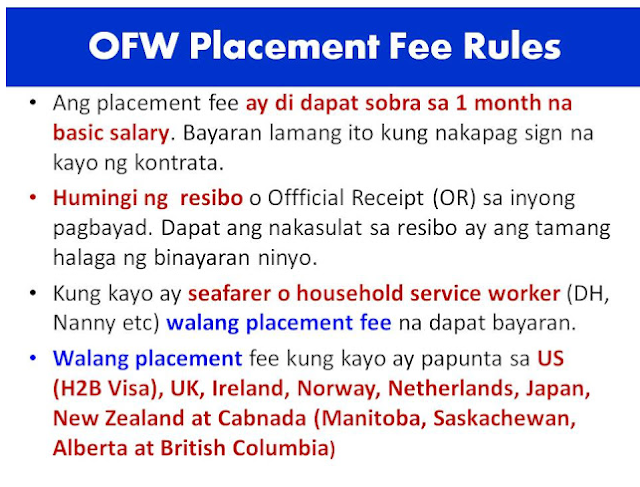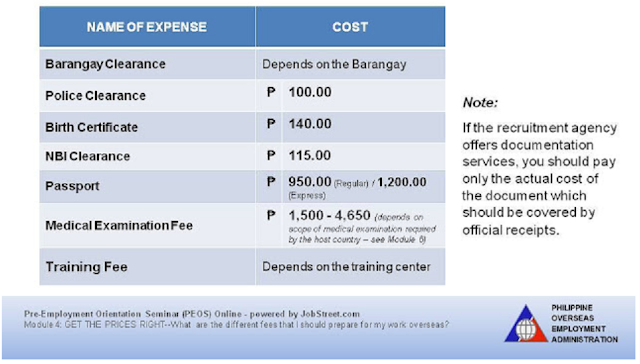Posted by Belarmino Dabalos Saguing
Rome, Italy, May 24, 2016
OFWs: List Of Basic Fees/Expenses When Applying For Job
If you are applying for job as an OFW, it is very important to be aware
of the fees associated with your job application to avoid illegal recruitment
or scam. Be vigilant when you get text messages asking you to pay for
reservation fees. 1. PLACEMENT FEE- Some agencies ask for
placement fees more than what the law allows. Some don't, but if you are
wondering how much it might cost:
If
you are applying as household
service worker, such as domestic helper, family driver, family cook, etc. You don't have to pay placement fee.
Seafarers or seaman are also exempted from paying placement fees.
There is a list of countries that exempts workers from paying placement fees. US (H2B Visa), UK, Ireland, Norway, Netherlands, Japan, New Zealand at Canada (Manitoba, Saskachewan, Alberta and British Columbia)
Seafarers or seaman are also exempted from paying placement fees.
There is a list of countries that exempts workers from paying placement fees. US (H2B Visa), UK, Ireland, Norway, Netherlands, Japan, New Zealand at Canada (Manitoba, Saskachewan, Alberta and British Columbia)
If
you don't fall into the exempted category, your agency might collect or might
not. If there is a placement fee that should be collected from you it should
not exceed the 1 month equivalent of your basic salary. There are still agencies that hire OFWs for Middle
East that does not require placement fee.
Pay only the placement fee once you have signed the contract, and ask for official receipt (OR).
Pay only the placement fee once you have signed the contract, and ask for official receipt (OR).
It is also very
important to have the appropriate visa for the job you are applying for. Never
allow the agency or foreign employer to give a visa different from the job
being offered to you. There are many cases of OFWs specially in the Middle East
where OFWs are promised with jobs in hospitals, hotels, or restaurant but
they ended up working as domestic worker. The visa on your passport can also
serve as your protection, and it will help you enjoy the benefits of your profession.
There are list of professions that gives you chance to bring your family with
you, and your profession will be based on what is on your visa.
2. TRAINING FEE- Some jobs will require you to get training certificates
if you don't have one. Training fees depend on how much the training centers
charge, private training centers usually charge more. If you want to save on
training fee, you can visit nearest TESDA center and check if they are
providing the training and certifications you needed before applying for
job. Besides, even if you don't get hired overseas, you can still use the
skills you earned and you can have certificate and credentials which you can
use again next time you apply for job.
3. DOCUMENTATION FEE- You will be required to submit documents like
Police or Barangay Clearance, passport, NBI and other documents needed to
process your application. Here is a table provided by POEA to give you ideas on
how much it will cost.
4. PROCESSING AND OTHER FEES- There are also other fees you which the
agency might ask you to pay. Here is a table of fees that you should pay and
those that your employer should pay. Remember, you don't have to pay for your
plane ticket or visa, it is the responsibility of your employer. The Philhealth
fee is also no longer mandatory for OFWs, however if an OFW has dependents in
the Philippines we would suggest that you consider this for their benefit in
case of hospitalization.




No comments:
Post a Comment